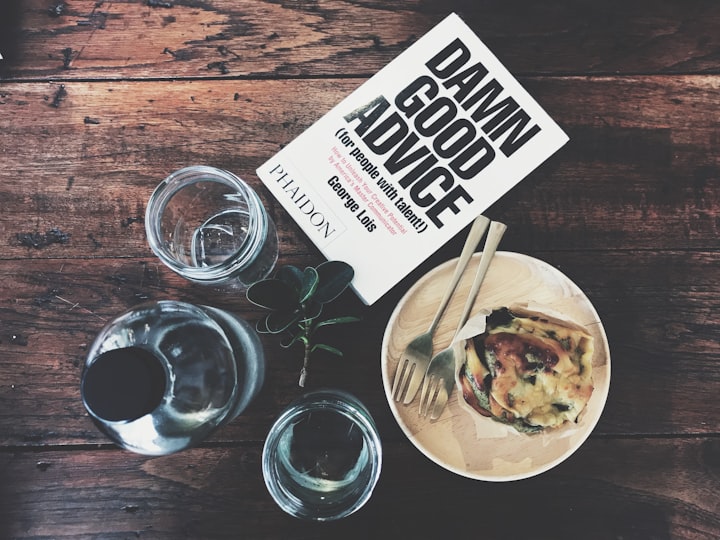
Advice is everywhere! You will hear it from your television, from your friends and relatives, from your teachers, when you log in to your social media, here on Vocal and even from strangers in the streets.
We love to give and receive advice. Most of us also love to seek it. Seeking advice especially when making decisions is important and even recommended. It will give you a wide range of choices to choose from, it can be informative and can help you make the best decisions.
When going through a bad situation, good advice can help us cope through and even overcome it.
Even though the advice may be easily available, that doesn’t necessarily mean that all the advice we give or receive is good.
Sometimes we advise because it is asked of us and sometimes it may be unsolicited which can be annoying especially when you are the recipient.
“Coaches don’t play.”
Is what we say when we give people advice that we can’t follow ourselves or are not in a position to do so. A single person giving relationship advice is a good example of this saying.
“Preaching water and drinking wine.”
Is what we say when the person giving us advice does the exact opposite of what they are telling us. When someone tells you to spend all your money because life is short yet they are quietly saving theirs is a portrayal of this. Another example is a preacher telling you to shun material property and instead aspire for heavenly riches while they are living lavishly in sprawling mansions, driving supercars and flying in private jets.
Misleading advice
Some advice can be given with the sole purpose of misleading others especially those with gullible minds. A cult leader or politician issuing harmful or unlawful orders or directions to their gullible followers in an example.
Manipulation
Others may use their position and opportunities of giving the advice to manipulate their audiences for personal gain. When a salesman pushes their product to you even when they know its faults or when a preacher threatens you with eternal damnation for not giving them offerings are prime examples.
To avoid being misled or being manipulated, and to benefit from the information that others give you, it is important to discern good advice from the bad.
Here are questions to ask yourself when giving and especially when receiving advice.
Is it helpful?
Is the advice you are getting adding value to your life. Does it improve it?
If you followed some advice you received and it left you satisfied, happy and thriving that would be helpful and good advice.
Is it in line with your beliefs and values?
Any advice that conflicts with your core beliefs and values is not good advice.
As a vegan, any health advice that tells you to consume animal products to fix a health issue might do more harm than good. As breaking a core belief might come along with its fair share of inner conflict, such advice would not be helpful.
Telling a Muslim to consume pork or a Buddhist to consume beef would be disrespectful as it would conflict with their religious beliefs.
Fashion advice that would have women practising Islam reveal their hair would not be good.
Is it lawful?
If some advice pushes you to break the law, then that is bad advice.
When going through some financial troubles, anyone who would tell you to commit fraud, to con others or steal from them would be giving you bad advice.
While thinking that you may be fixing an issue, engaging in unlawful and illegal activities could end up pulling you into even bigger troubles such as imprisonment or even death.
Is it simple?
Good advice is easy to understand and to follow through. It is advice that is presented in simple language and with clear instructions that are also easy to follow.
Is it healthy?
If someone tells you to engage in cocaine to deal with your depression or to go to steal to deal with your money problems, then that is outrightly bad advice.
When going through some troubles in your relationship and someone tells you to go have physical fights to solve them, then that is bad advice.
Good advice is healthy mentally, physically and emotionally. It does not cause trouble, lead to self-harm or cause harm to others.
Is it trustworthy?
You should be able to trust the advice someone is giving you. For that advice to be beneficial, it is also important that the person giving it be trustworthy too.
When Donald Trump advised Americans to drink bleach to manage the Corona Virus, that advice was untrustworthy as it is well known that bleach is not fit for human consumption in the first place.
Is it permanent?
Good advice will bring permanent solutions to a problem and will not be just there as a placeholder.
A salesman should recommend products that will solve your issue completely and in the long-term. If you have a leaking roof and the solutions they are giving you will leave you making several trips back to their shop, then those solutions are bad advice and the salesperson could be misleading you so that you can keep bringing business to them.
Is it within your reach? / Is it realistic?
Can what is being proposed to you be achieved realistically?
Any advice that purports to make you a millionaire overnight or could help you lose 20 kgs in 1 day is bad advice. If anyone is telling you ways that can get you rich through a miraculous encounter, that would be unrealistic and is bad advice.
Good advice should be attainable by the person receiving it.
Can you achieve what you are looking for with the tools you have based on the advice given?
Telling a person that lives in cold countries to catch some vitamin D from sunlight during winter is unrealistic because recommending them substitutes such as consuming foods rich in vitamin D or taking supplements would be the best way to go about it.
When Marie Antoinette asked that her poor people eat cake when they couldn’t get bread was a classic example of unrealistic advice.
Unreachable advice is preposterous, ignorant, disrespectful and can be annoying.
...................
Bad advice in general can leave a person in need worse off than when they started. It is therefore important that we recognise good advice before we decide to follow through with it.
About the Creator
Gal Mux
Lover of all things reading & writing, 🥭 &
🍍salsas, 🍓 & vanilla ice cream, MJ & Beyoncé.
Nothing you learn is ever wasted - Berry Gordy
So learn everything you can.






Comments (1)
<3